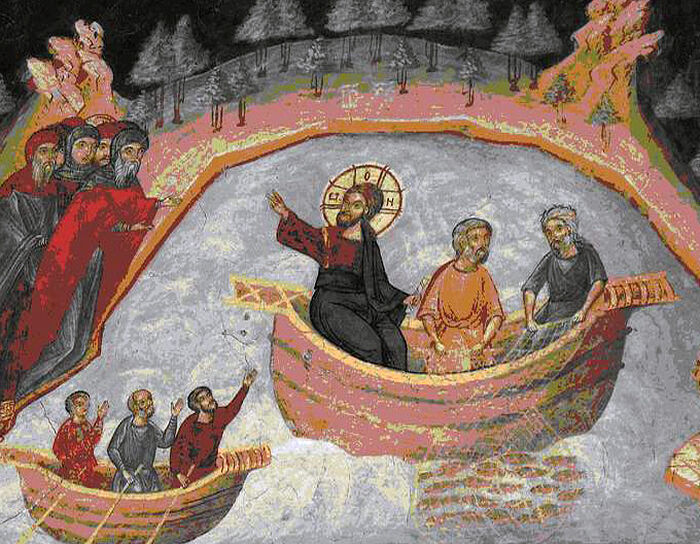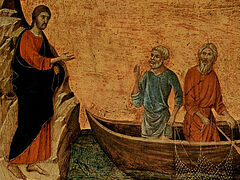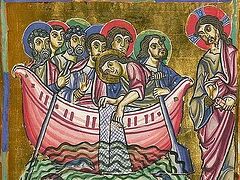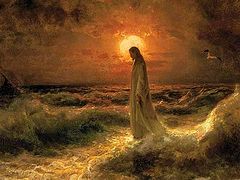And it came to pass, that, as the people pressed upon Him to hear the word of God, He stood by the lake of Gennesaret, And saw two ships standing by the lake: but the fishermen were gone out of them, and were washing their nets. And He entered into one of the ships, which was Simon's, and prayed Him that He would thrust out a little from the land. And He sat down, and taught the people out of the ship. Now when He had left speaking, He said unto Simon, Launch out into the deep, and let down your nets for a draught. And Simon answering said unto Him, Master, we have toiled all the night, and have taken nothing: nevertheless at Thy word I will let down the net. And when they had this done, they inclosed a great multitude of fishes: and their net brake. And they beckoned unto their partners, which were in the other ship, that they should come and help them. And they came, and filled both the ships, so that they began to sink. When Simon Peter saw it, he fell down at Jesus' knees, saying, Depart from me; for I am a sinful man, O Lord. For he was astonished, and all that were with him, at the draught of the fishes which they had taken: And so was also James, and John, the sons of Zebedee, which were partners with Simon. And Jesus said unto Simon, Fear not; from henceforth thou shalt catch men. And when they had brought their ships to land, they forsook all, and followed Him (Lk. 5:1-11).
Today’s Gospel talks about when the Lord called His Disciples to ministry. Christ went out to Lake Gennesaret where the Galilean fishermen were laboring, and began to preach about the new life that was revealed to mankind with His coming. Huge crowds of people, pressing Him, eagerly listened to His every word. We can see how at all times the faithful eagerly listen to true preaching. Laying aside all affairs, people rush to where the true word of God sounds forth. There are so many people that there seems to be no room left for the Lord—at least on earth.
Among these huge crowds, He stands, as if merging with everyone, such that He’s not visible. So He asks one of the fishermen, Simon, to let Him get into his boat and set out a bit from shore. The Church and he who speaks the word of God must thrust out a little from the land; a little—so as to be seen and heard from the land; seen—as the Lord will be seen when He is lifted up on the Cross and draws all to Himself, as He Himself says. This mystery is already present here.
His voice is heard, no matter how many people there are. The hour is coming, and now is, when the dead shall hear the voice of the Son of God: and they that hear shall live (Jn. 5:25). The dead will hear His voice, and today they hear, as He Himself says. He that hath ears to hear, let him hear. No matter how softly Christ spoke, no many how many people there are, the whole of mankind can hear His voice.
After that, the Lord tells Simon, the future Apostle Peter, and also James and John, the sons of Zebedee, to return to their usual earthly business—to go fishing. Master!—answers Peter—we have toiled all the night, and have taken nothing: nevertheless at Thy word I will let down the net. The labors of all men were in vain without Christ, as the Apostle’s nets were empty. Mankind has made many efforts to arrange a good life on earth. It has built more than one Tower of Babel, and it seems to have reached the sky, but all without Christ God. We beheld the construction of so-called communism, and then followed the so-called Perestroika. But the Lord scattered everything, and He is now scattering all works done without God. The whole night of the construction of human history turns out to be futile, fruitless, in vain.
Launch out into the deep, Christ says to Peter, and let down your nets for a draught. It’s only when we cast the nets of our labors as Christ says that there will be success. However, there is something irritating for materialists in this answer. If these people have left their boats and nets forever, why the miracle of a grandiose catch? From the point of view of the world, there’s something preposterous in the fact that after the greatest earthly success, they leave everything without even taking advantage of it. But for us, there is deep meaning in this. Such a catch as they had that day could show everyone how little satisfaction there is in completely material success. No mountains of bread can satisfy the hunger of human souls; no rivers of milk can quench the thirst of our hearts.
They’re simple fishermen, who labored all night. Tired and disappointed, they show special obedience to Christ. At Thy word, Peter says to the Lord, I will let down the net. And a great miracle occurs. So many fish were caught that the nets burst; such a huge catch that the fishermen can’t handle the fish, they can’t pull it up, so they wave to those in the other boats, calling for help. And finally, both huge boats, overloaded with fish, start to sink.
The fishermen know how valuable their luck is—it’s their trade. The Lord shows them what human labor means, and what the word of the Lord means. These aren’t just very strong words, penetrating to the very depths of the heart. This is said by He Who is the Lord of all the seas, all the earth, Who rules over the fish and the waves, over storms and seas, over all people. He is the Lord Almighty, Who wants to give true life to all people.
And Simon Peter falls at Christ’s feet and says: Depart from me; for I am a sinful man, O Lord. “What are you saying, Peter?!” exclaims St. Dimitry of Rostov. “Isn’t that what the devil says? You will speak one day about the Savior’s forthcoming sufferings: “May this not be with Thee, merciful Lord,” and He answers him: “Depart from Me, satan! You’re a temptation to Me! Because you think not of the things of God, but of man” (cf. Mt. 16:23). Perhaps even now the devil, who can’t endure the presence of Christ God, says through Peter: Depart from me? Or perhaps Peter is like the Gadarenes, who after the healing of the demon-possessed man, beg the Lord: “Depart from us.” It’s practically the same words we hear from Peter. Only he doesn’t say them like that. The devil says these words, knowing what awaits him. The Gadarenes ask, “Depart, Lord,” because they lament their pigs. But Peter says it because he’s deeply aware of his unworthiness. He begins to understand that it’s impossible to see God and not die. He is gripped by fear and terror. Maybe he should have said: “Depart not from me, Lord, never,” as he will later say: To whom shall we go?—when all are bewildered, and the Lord will talk about what His calling means. Lord, to whom shall we go? Thou hast the words of eternal life (Jn. 6:68). Peter’s holiness begins with the fact that he has a sense of sin. The fear of God is always the beginning of holiness.
The appeal of Peter, to whom the Lord said: Launch out into the deep, and let down your nets for a draught, is an image of what awaits him, all the Apostles, Holy Hierarchs, and the entire Church. Of what depth does the Lord speak? Of the depth where the forgiveness of sins is given, where the awareness of one’s sinfulness leads to repentance that opens the Kingdom of Christ—the Lord Himself. And then you can leave everything, as the Apostles leave everything.
There’s a great difference between the Peter who will thrice deny Christ and the Peter who on the day of Pentecost will convert thousands of people to Christ with the word of the Cross. The Lord invites us to think not only about the secret of our material success, but also about the mystery of the success of the Church’s preaching.
The depth is the word of God: to hear what Christ said to the people from the boat; to learn the power of the word of God, by which the world was created; to feel the truth and sweetness of this word, which is greater than the world and all that is in it. But this Word, as says the Apostle John the Theologian, must be in us. The depth is love. This is the Cross the Apostles will use like a fishing rod to catch the souls of men.
There where the nets are empty, where there is nothing, where no one seems to want to come to Christ, we must look at the sea of life with the eyes of Christ, with His love. What did Patriarch St. Tikhon and our archpastors, the New Martyrs and Confessors of Russia go through when the mass apostasy from the faith began? What is the Church going through today? What opportunities there were when a change occurred in the country, when the doors of the churches swung open, and it seemed that millions of yesterday’s atheists were about to come into the Church! Who scared them off, like fish, so that everyone veered and swam by? Who beckoned them with rich bait? And so, how many there are, carried by the current in dirty, poisoned waters, because only the living can go against the current! We suffered defeat both here and there. Most of us throw up our hands, and some are ready to give up altogether. We missed the most favorable circumstances for fishing; everything is against us now.
But still, in the midst of evil there is the Cross of Christ, and the more that evil rages in the world, the more grace comes from it. And the Apostle Peter says: “Whatever the adverse circumstances, we’ll try again.” Too often we do nothing, waiting for favorable times to come, when they very well may never come! If you want a miracle to happen—for your brother, or mother, or friend, or enemy to turn to the Lord—you have to direct your whole life to obedience to Christ according to His word, which calls us to try to do the impossible. Can it really be in vain that, just as He did to Peter on the Sea of Tiberias, speaking of the new miraculous catch of fish—of everything earthly and Heavenly—the Risen Christ appeared to the entire Church and sent us to conquer the evil-ridden world?!




